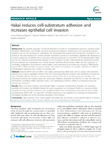Hakai reduces cell-substratum adhesion and increases epithelial cell invasion

Ver/
Use este enlace para citar
http://hdl.handle.net/2183/19565Coleccións
- INIBIC-OCT - Artigos [21]
Metadatos
Mostrar o rexistro completo do ítemTítulo
Hakai reduces cell-substratum adhesion and increases epithelial cell invasionAutor(es)
Data
2011-11-03Cita bibliográfica
Rodríguez-Rigueiro T, Valladares-Ayerbes M, Haz-Conde M, Aparicio LA, Figueora A. Hakai reduces cell-substratum adhesion and increases epithelial cell invasion. BMC Cancer [Internet]. 2011 Nov 3 [acceso 2017 Oct 3];11:474. Disponible en: https://bmccancer.biomedcentral.com/track/pdf/10.1186/1471-2407-11-474?site=bmccancer.biomedcentral.com
Resumo
[Abstract]
Background. The dynamic regulation of cell-cell adhesions is crucial for developmental processes, including tissue formation, differentiation and motility. Adherens junctions are important components of the junctional complex between cells and are necessary for maintaining cell homeostasis and normal tissue architecture. E-cadherin is the prototype and best-characterized protein member of adherens junctions in mammalian epithelial cells. Regarded as a tumour suppressor, E-cadherin loss is associated with poor prognosis in carcinoma. The E3 ubiquitin-ligase Hakai was the first reported posttranslational regulator of the E-cadherin complex. Hakai specifically targetted E-cadherin for internalization and degradation and thereby lowered epithelial cell-cell contact. Hakai was also implicated in controlling proliferation, and promoted cancer-related gene expression by increasing the binding of RNA-binding protein PSF to RNAs encoding oncogenic proteins. We sought to investigate the possible implication of Hakai in cell-substratum adhesions and invasion in epithelial cells.
Methods. Parental MDCK cells and MDCK cells stably overexpressing Hakai were used to analyse cell-substratum adhesion and invasion capabilities. Western blot and immunofluoresecence analyses were performed to assess the roles of Paxillin, FAK and Vinculin in cell-substratum adhesion. The role of the proteasome in controlling cell-substratum adhesion was studied using two proteasome inhibitors, lactacystin and MG132. To study the molecular mechanisms controlling Paxillin expression, MDCK cells expressing E-cadherin shRNA in a tetracycline-inducible manner was employed.
Results. Here, we present evidence that implicate Hakai in reducing cell-substratum adhesion and increasing epithelial cell invasion, two hallmark features of cancer progression and metastasis. Paxillin, an important protein component of the cell-matrix adhesion, was completely absent from focal adhesions and focal contacts in Hakai-overexpressing MDCK cells. The expression of Paxillin was found to be regulated by a proteasome-independent mechanism, possibly due to the decreased abundance of E-cadherin.
Conclusions. Taken together, these results suggest that Hakai may be involved in two hallmark aspects of tumour progression, the lowering cell-substratum adhesion and the enhancement of cell invasion.
Palabras chave
Adherens junctions
Blotting
Cell adhesion
Cell line, tumor
Cell-matrix junctions
Epithelial cells
Focal adhesion kinase 1
Neoplasm invasiveness
Paxillin
Ubiquitin-protein ligases
Vinculin
Blotting
Cell adhesion
Cell line, tumor
Cell-matrix junctions
Epithelial cells
Focal adhesion kinase 1
Neoplasm invasiveness
Paxillin
Ubiquitin-protein ligases
Vinculin
Versión do editor
Dereitos
Atribución 3.0 España
ISSN
1471-2407






